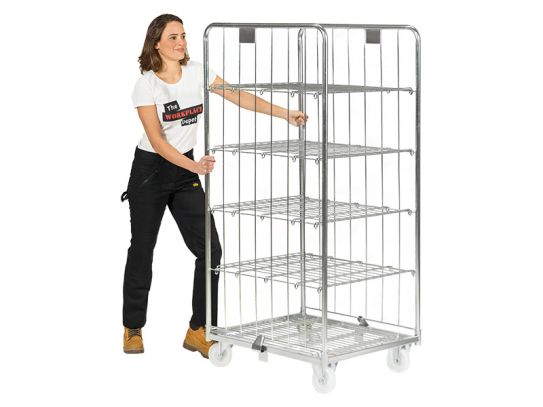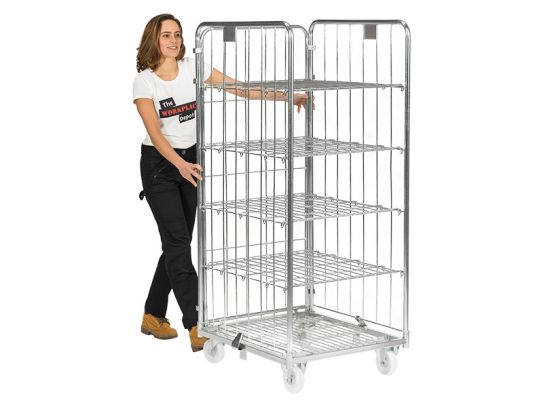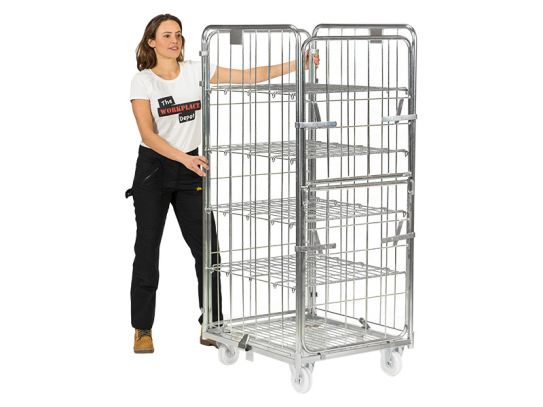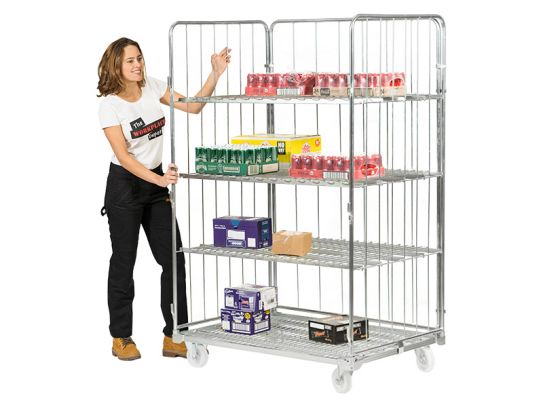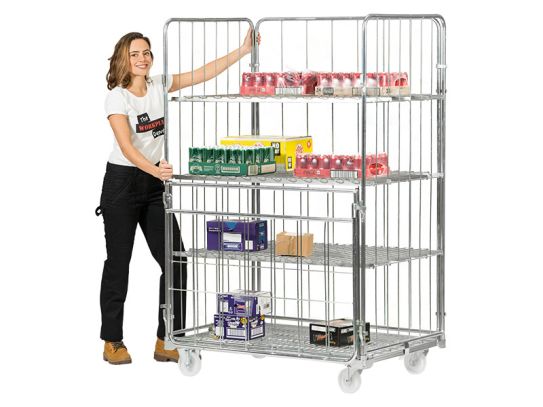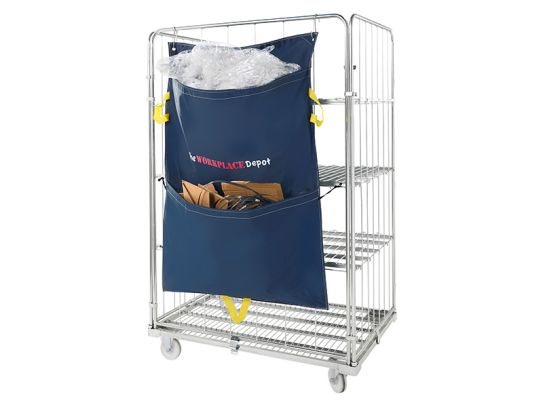Roll Containers
Efficient Storage and Transport for Any Environment
Roll containers are the perfect solution for organising and storing your items. Their durable construction and convenient design make them ideal for any business or home. With a range of sizes and colours to choose from, you can find the perfect roll container to fit your needs. Easy to manoeuvre and stack, these roll containers will help you keep your space organised and clutter-free. Plus, their sleek and modern design means they'll look great in any setting. Order yours today and start enjoying the benefits of convenient, organised storage.
What Is a Roll Container?
Roll containers are a type of storage and transport equipment that is commonly used in industrial and commercial settings. They consist of a frame with wheels, and they typically have a set of removable shelves or bins inside for organising and storing items. Roll containers are used for storing and transporting materials and goods, and they are known for their durability and versatility. They are often used in warehouses, factories, and distribution centres, as well as in retail stores and office environments.
What Are Some Common Uses for Roll Containers?
Roll containers are commonly used in a variety of industrial and commercial settings. They are often used in warehouses, factories, and distribution centres for storing and transporting materials and goods. They are also frequently used in retail settings for organising and displaying products. In addition, they are sometimes used in office and school environments for storing and organising documents and other items. Roll containers are typically used in environments where space is at a premium and there is a need for efficient, organised storage and transport of items. They are also often used in environments where items need to be easily accessible and able to be moved around quickly and efficiently.
What Are the Different Types of Roll Containers?
There are several different types of roll containers, each of which is designed for specific uses and environments. Some of the most common types of roll containers include:
- Standard roll containers: Standard roll containers are the most common type, and they typically have a rectangular shape with a set of removable shelves or bins inside. They are often used for storing and transporting materials and goods in warehouses and other industrial settings.
- Nesting roll containers: Nesting roll containers are designed to be stacked on top of each other when not in use, which allows them to take up less space. They are often used in environments where space is limited, such as in retail stores or offices.
- Collapsible roll containers: Collapsible roll containers can be folded down when not in use, which makes them easy to store and transport. They are often used in environments where items need to be moved around frequently, such as in distribution centres or on delivery trucks.
What Are the Key Features to Consider When Choosing a Roll Container?
There are several key features to consider when choosing a roll container, including size, capacity, durability, and manoeuvrability. Here are some specific things to consider:
- Size: The size of the roll container is important because it will determine how much it can hold, and whether it will fit in the space where it will be used. Be sure to measure the space carefully and choose a roll container that will fit without being too large or too small.
- Capacity: The capacity of the roll container is important because it will determine how much it can hold. Consider the types and quantities of items that will be stored in the roll container, and choose a size that will accommodate them.
- Durability: The durability of the roll container is important because it will need to withstand regular use and handling. Look for roll containers that are made from sturdy materials such as steel or heavy-duty plastic, and that have reinforced corners and edges to prevent damage.
- Manoeuvrability: The manoeuvrability of the roll container is important because it will need to be moved around easily. Look for roll containers with sturdy wheels that roll smoothly, and that have a handle or other gripping surface for easy movement.
What Are the Benefits of Using Roll Containers?
The key features of roll containers provide several benefits, including:
- Efficient storage: The size and capacity of roll containers make them efficient for storing a wide range of items. They can be easily stacked, which allows users to maximise the available storage space.
- Convenient transport: The manoeuvrability of roll containers makes them convenient to use for transporting items from one location to another. The wheels and handle allow users to easily move the roll container, even when it is fully loaded.
- Long-lasting durability: The durable construction of roll containers means that they can withstand regular use and handling, which helps them last longer and provides a good return on investment.
- Easy maintenance: The removable shelves or bins of roll containers make them easy to clean and maintain. This ensures that they remain in good working condition and continue to provide efficient storage and transport.
How Do You Properly Clean and Maintain a Roll Container?
Proper cleaning and maintenance of a roll container is important to ensure that it continues to function properly and safely. Here are some tips for properly cleaning and maintaining a roll container:
- Regularly inspect the roll container for signs of damage or wear, such as bent or broken parts, loose or missing screws or bolts, or cracks or other deformities in the material. Repair or replace any damaged parts as needed to maintain the integrity of the roll container.
- Clean the roll container regularly to remove dirt, dust, and other debris that can accumulate on the surface. Use a soft, damp cloth or sponge to gently wipe down the surface, and avoid using harsh chemicals or abrasive cleaners that could damage the roll container.
- Lubricate the wheels and other moving parts regularly to ensure smooth operation. Use a light lubricant, such as silicone spray or graphite powder, and apply it according to the manufacturer's instructions. Avoid using too much lubricant, which can attract dust and debris.
- Store the roll container in a dry, well-ventilated area when not in use. Avoid exposing the roll container to extreme temperatures or moisture, which can cause damage.
By following these tips, you can help ensure that your roll container remains in good working condition and continues to provide reliable, safe storage and transport for your items.
Are There Any UK or European Industry Standards or Regulations That Apply to Roll Containers?
There are several UK and European industry standards and regulations that apply to roll containers. These standards and regulations are designed to ensure the safety, quality, and performance of roll containers, and they apply to all manufacturers, suppliers, and users of roll containers. Some of the most relevant standards and regulations include:
- EN 840: This is the European standard for plastic pallets for materials handling, which includes requirements for the design, testing, marking, and performance of roll containers.
- BS EN 13198: This is the British standard for roll containers, which specifies requirements for the design, construction, performance, testing, and marking of roll containers.
- ISO 286-1: This is the international standard for geometric tolerancing, which specifies the tolerance limits for roll containers and other materials handling equipment.
- The Health and Safety at Work etc. Act 1974: This UK law sets out the general duties of employers and employees to ensure the health and safety of workers, including the use of roll containers.
There may be other specific standards and regulations that apply depending on the specific use and environment of the roll container.
